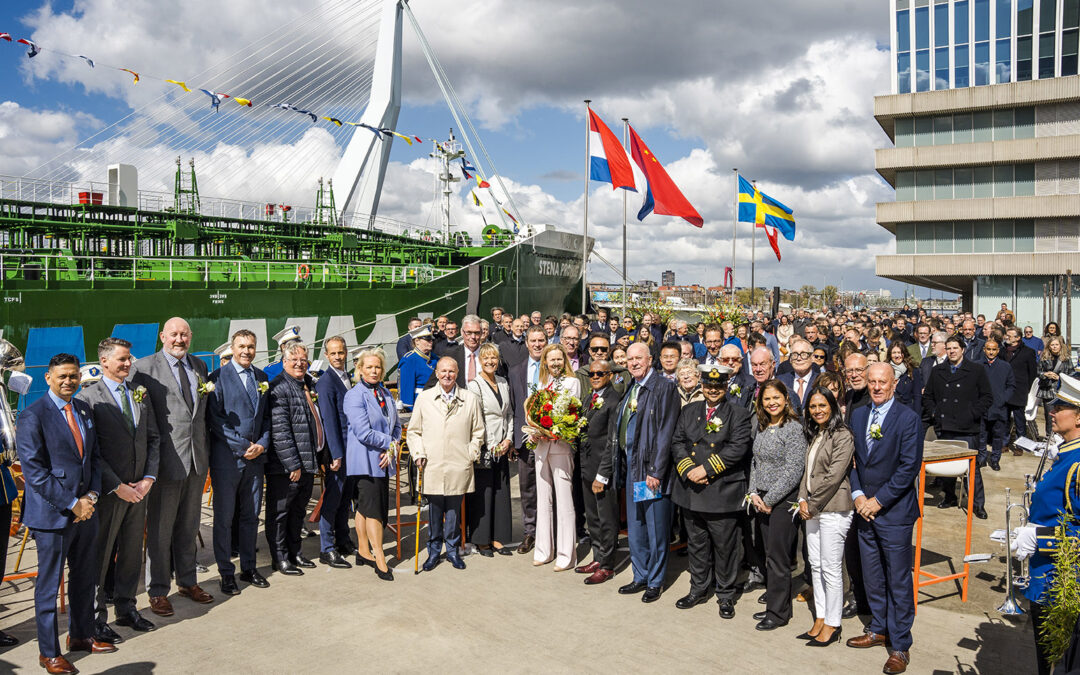On the 26th of April, Proman Stena Bulk named its new methanol-powered tanker in Rotterdam. Although Proman is already taking steps to reduce emissions during the production of its methanol, switching to green methanol in the future still has some challenges.

This article was written by Bas Lenferink (pictured on the right), SWZ editor and student of Marine Technology at the TU Delft, lenferinkb@outlook.com.
The Stena Promise is the third ship in a series of six methanol powered ships in the IMOIIMeMax series. Proman Stena Bulk is a Joint venture between methanol producer Proman and tanker company Stena Bulk. Of the six ships the joint venture is developing, four have already been built. The Stena Promise is the first ship fully owned by Proman.
The Port of Rotterdam was chosen for the ceremony because its role in the decarbonisation of the maritime industry. It was also the port in which the first barge to ship bunkering of methanol took place.
Conventional fuels as backup
The IMOIIMeMax ships are designed to carry IMO 2 and 3 cargoes, with the energy efficiency of the ship in mind. A MAN dual fuel engine is the main propulsor. The default fuel is methanol, but the dual-fuel engine can also run on conventional fuels. In case of a problem with the methanol supply, the engine can switch to marine diesel oil (MDO) or marine gas oil (MGO) without the need of shutting down.
During voyages, there is always MDO or MGO on board to serve as a backup when the methanol system fails. The drive train is equipped with a shaft generator, which will deliver electrical power to the ship when underway. Because of the shaft generator, no additional auxiliary diesel generators are needed when underway. All ships of the series are built at Guangzhou Shipyard International (GSI) in China. In total, the Stena Promise cost USD 44 million to build.
Also read: Proman Stena Bulk names new methanol tanker in Rotterdam
Reliable, available and easy handling
Methanol is the fuel of choice for the series because of its reliability, availability and easy handling. Proman Stena Bulk is not the only party choosing methanol. According to DNV, over one hundred methanol fuelled ships are on order as of the end of March.
Methanol does not need to be stored cryogenic, because it is a stable fuel. This means, that in many cases there is not much additional infrastructure needed in ports to store methanol. There are already more than 120 ports were methanol can be bunkered. Methanol has been more cost effective than MGO for the last ten years, with prices being ten per cent lower.
Both Proman and Stena Bulk have many years of experience handling methanol, so that is not a new challenge for them. The crew of the IMOIIMeMax ships do need additional training in handling a methanol-powered ship. They are trained by Stena Bulk itself, to ensure enough compatible crew for all six ships.
EEDI compliance
Lower fuel costs are a nice additional benefit for the ships, which use approximately 11,500 tonnes of methanol each year. As an alternative fuel, methanol performs better than conventional marine fuels in terms of emissions. The emission of CO2 and NOX is reduced, while there is almost no emission of SOX and particulate matter.
The EEDI of the ship lies eleven per cent below the 2025 phase 3 requirements and Proman Stena Bulk expects to operate in the current way up until 2035 in compliance with the EEDI rules.
Also read: How methanol kits for diesel engines allow for quick conversions
Current methanol not yet green
On paper methanol sounds like the solution, but there’s a catch. Almost all of the methanol the ships are sailing on right now, is produced in a process using methane and CO2. During the combustion of methanol, fewer emissions are released in comparison to methane, but there still is more CO2 coming into the carbon cycle.
Also, most methanol is produced with an energy source that relies on fossil fuels. The emissions of the ship might be lower, but the well-to-wake emissions will still be there.
In its Trinidad factory, Proman uses one million tonnes of CO2, which is a residue from their ammonia production, in the production of their methanol. By this way of carbon capture, the net emissions of CO2 during the production of methanol are reduced.
The company is also building a new factory in Quebec, Canada, which uses the gasification of waste to produce methane, which is then turned into methanol using hydroelectric power. This way, green methanol can be made in a process with no carbon emissions. The factory is expected to produce 100,000 tonnes of methanol per annum.
Also read: VIDEO: First ship completes net-zero trans-Atlantic voyage on bio-methanol
Will price inhibit uptake?
Right now, methanol is cheaper than conventional fuels. However, this methanol is produced using mostly fossil fuels. Green methanol is much more expensive. It is a developing product, so prices will most likely come down more in the future.
Yet, like most green alternative fuels, prices will probably remain higher than those of current fuels. Green energy is more expensive than fossil fuels. It is interesting to see whether the ships will keep sailing on methanol, if the price of methanol rises substantially. There are a lot of LNG powered ships with dual fuel engines that are now sailing on more polluting fuels again, because of the drastically risen gas prizes. At the end of the day, companies will have to make ends meet and operate profitably.
Both Proman Stena Bulk and Stena Bulk have no new projects with methanol-powered ships in development. They are awaiting the results of this generation of methanol-powered tankers and current new build prices are not favourable.
Being green requires green production
Methanol is a promising fuel and the IMOIIMeMax ships are definitely a new generation of ships and a step to the future. The next frontier is on the side of the methanol production. Methanol-powered ships will only be “green” when the fuel is produced with green energy and originating from non-fossil resources. Only then the Stena Promise is a ship, that is truly ready for the future.
Picture (top): Proman and Stena Bulk VIPs gather to celebrate the naming of Stena Promise.
Also read: New study maps safety risks of using methanol, LNG, hydrogen and ammonia in ships








